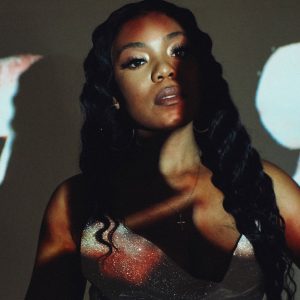Album Review | ‘There Is No End’ for Tony Allen
Before he died, the Nigerian drummer had completed just one song on There Is No End, but the album’s sensitive posthumous production using Allen’s chosen musicians makes it worthy of the artist.…
Author:
19 May 2021

The silence that bookends Nigerian music legend Tony Allen’s posthumous album There Is No End is a poignant reminder of why one of the world’s greatest drummers will be sorely missed. Released at the beginning of May to mark the first anniversary of Allen’s death, the album opens with 29 seconds of silence, titled Tony’s Praeludium, and ends with 26 seconds of silence, titled There’s No End.
These opening and closing moments function in a similar way to experimental composer John Cage’s composition 4′33″, where meaning is derived in the lack. Cage famously instructed the musicians not to play their instruments at all through the performance of 4′33″, instead revealing the environmental sound of the performance space uninterrupted by musicians.
While Tony’s Praeludium does not necessarily have an environmental sound performance in mind, it is through the lack of sound that the listener is reminded that Allen has been silenced and that what is to follow is one last ride with the master of rhythm.

As Tony’s Praeludium comes to an end, listeners hear the album’s first notes, the bass drop of Stumbling Down, which features the scintillating skills of Australia-based Zambian rapper Sampa the Great. Lyrically, Sampa feels completely in tune with Allen’s spirit on this collaboration, turning the song into a statement of artistic intent and a laceration of lazy unthinking art.
Emerging on the other side of the album, 43 minutes later, having listened to a host of innovative young musicians join Allen for this last ride, you are confronted with the silence of There’s No End.
This last moment of silence doesn’t conjure up feelings of mourning like Tony’s Praeludium. Over the previous 43 minutes you have realised that while Allen may no longer be with us in physical form, his spirit and music always will be and we can see it clearly evident in the artists who have followed in his footsteps. So much so, that it’s almost impossible not to interpret There Is No End as Allen’s handing down of the torch to a younger generation.
Handled with care
Allen began work on There Is No End in 2019, recording drum tracks with French producer Vincent Taeger, who was at the helm for Allen’s 2014 album Film of Life. However Cosmosis, the album’s first single, featuring British grime star Skepta and Nigerian writer Ben Okri, was the only song to have vocals recorded while Allen was still alive.
Allen and Skepta had been collaborating on the song How Far for Damon Albarn’s cartoon pop band Gorillaz when Okri walked into the studio. With Allen on drums and Albarn on keys, Cosmosis was recorded live in a single take with Okri and Skepta alternating between spoken word and rapping.
However, before he died, Allen had identified the other musicians and vocalists he wanted to collaborate with for each of his new compositions. So in the wake of his death, Taeger and Vincent Taurelle, his co-producer on the album, set to work completing Allen’s vision.
Related article:
Finishing a posthumous album is a tricky affair, so that There Is No End sounds like a vital and fresh addition to Allen’s discography is a tribute to the care Taeger and Taurelle took in handling Allen’s last songs, and the energy, artistry and understanding his collaborators brought to the table.
Kenyan rapper Nah Eeto, like Sampa the Great, is another rising African star who graces There Is No End, shining brightly on the song Mau Mau. Allen’s drum work on Mau Mau is top notch, a boisterous Afrobeat groove over which Nah Eeto delivers a devastating satirical flow, switching between Swahili and English.
Another highlight is One Inna Million, which features 23-year-old, London-based, lo-fi hip-hop artist Lava La Rue. Over a rolling bassline and a skittering drumbeat, Lava La Rue delivers fiery political verses and a cosmic chorus that will have fans of FKA Twigs sitting up and paying attention.
A darker side
The fact that Allen picked rappers from across the globe such as the Nepalese Tsunami, Sampa the Great, Lava La Rue and Nah Eeto gives the album much of its character. But Allen’s choice of collaborators from the more mainstream hip-hop market of the United States are also revealing, with many of them bringing a decidedly darker side to There Is No End.
One clear example is Gang On Holiday (Em I Go We?), which features Chicago producer and rapper Jeremiah Jae. Dark and menacing with thunderous percussion, the song sees Jae taking Allen’s drums into a much more aggressive context than we are used to hearing them, sharing sonic touchstones with Pink Siifu’s monumental 2020 album NEGRO, which Jae also featured on.

Deer In Headlights features Detroit rapper Danny Brown, one of the most innovative rappers of recent years. He doesn’t disappoint, bringing his mad flow to some addictively raw percussion from Allen.
ZelooperZ, a rapper who was part of Brown’s loose collection of Detroit rappers, Bruiser Brigade, also features on There Is No End. On Coonta Kinte, ZelooperZ takes on the heightened racial tension in America, spitting, “Why you want me in the ground, cover my skin in soil. I’m just a Black man in a world full of colours.”
The final missive
These collaborations with Brown, Jae and ZelooperZ really deliver. However, a handful of other US rappers fail to take their moment to shine, with a few of the album’s songs slipping past, barely leaving an imprint. Rich Black featuring Los Angeles rapper and producer Koreatown Oddity is one that springs to mind, while Hurt Your Soul featuring Maryland rapper Nate Bone is another. It’s not that these songs are poor, but when stacked up against the other glorious offerings of There Is No End, they can’t help but sound like fillers.
Related article:
If There Is No End were to be considered close to any of Allen’s previous albums, they would be 1999’s Black Voices and 2002’s HomeCooking. It was on these records that Allen began to branch out into the worlds of dub, hip-hop and electronic music, collaborating with French-Irish producer Doctor L, Blur frontman Albarn, British rapper Ty and vocalists Michael “Clip” Payne and Gary “Mudbone” Cooper from George Clinton’s Parliament-Funkadelic orbit.
Two decades later, those elements of dub, hip-hop and electronic music are all still evident on There Is No End. It’s an album where the bass is thick, the innovative drum patterns are dripping in dub production and the rappers for the most part flow with extreme skill.


